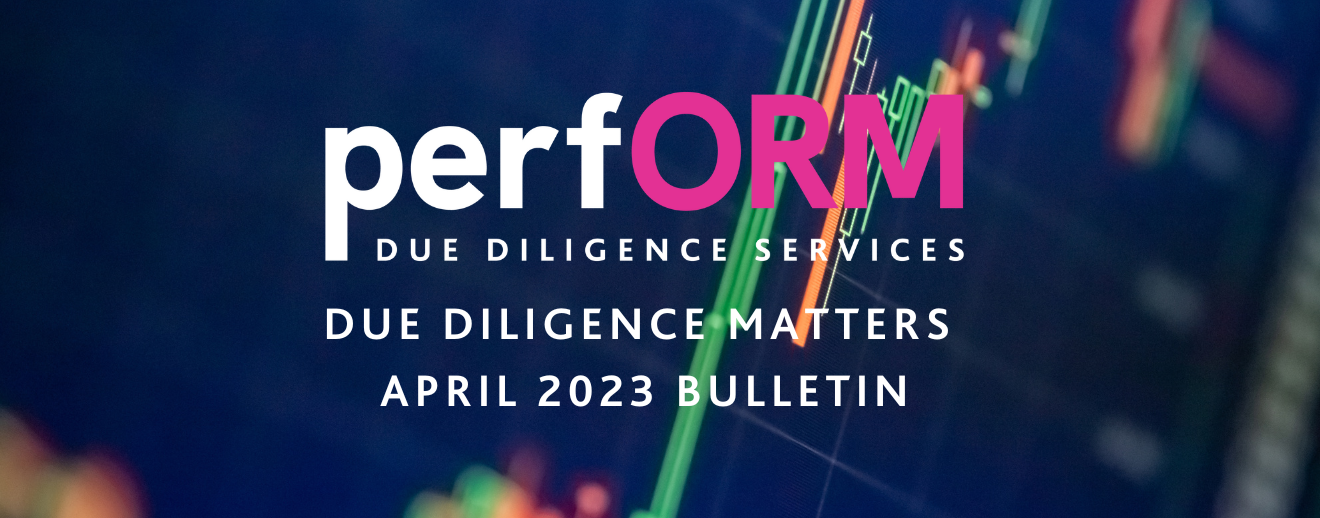



Due Diligence Matters - April 2023 Bulletin
Meet our Co-Founder
James Newman will be speaking at ‘The Institutional Investor and Asset Manager Consensus 2023 Roundtable’ in Austin on April 26th and will also be attending GAIM Ops Cayman this month. Please contact James to meet up.
Team
We are pleased to announce Kristin Melino, a highly experienced ODD professional, will be adding further strength and depth to our ODD bench as Senior Consultant. Based in NYC, Kristin has over 15 years’ relevant experience which includes senior roles at Aksia and UBS.
Missed the last bulletin?
Click here for the March 2023 edition.
perfORM Due Diligence Services is an award-winning provider of Operational Due Diligence solutions for a diverse and global base clients.
Counterparty Landscape
Counterparty risk is a key consideration for hedge fund investors. The collapse of Lehman in 2008 highlighted the importance of counterparty diversification and monitoring, with several blue-chip hedge funds suffering significant losses as a result of their Lehman exposure. Ironically, the losses suffered by Credit Suisse as a result of its prime brokerage relationship with Archegos in 2021 were to some extent the result of Archegos’s counterparty diversification.
The last few years have seen significant changes in the counterparty landscape. The blue-chip prime brokerage bench has contracted, with Deutsche Bank and Credit Suisse no longer available, crypto-friendly banks are fewer in number, FTX has demonstrated how disruptive a failure can be to confidence, and, as a result of these factors, and others, the barriers to entry for emerging hedge funds, both tradfi and crypto, are now higher.
There are solutions and options, and interestingly we are seeing they are less “institutional” for tradfi and more so for crypto. Are we witnessing a creep or even a shift away from traditional institutional counterparty risk mitigation? Hedge funds are increasingly looking to non-bank prime broker options, such as Interactive Brokers, Clear Street and TD Cowen. This presents a problem for ODDers, however, in that the counterparty risk of such entities is hard to monitor, in the absence of a share price or CDS spread or from the reassurance that comes from prudential regulation found at their bank prime broker cousins. (Did we say, ‘reassurance from prudential regulation?’ Credit Suisse, SVB, Signature we hear you shout and point taken.) Furthermore, banks have relatively big balance sheets, diversified business lines and are easier to assess operationally.
Over in cryptoland, institutional investors are demanding tradfi-equivalent assurances around asset security. Solutions in this more challenging space, the fundamental concept of which does not lend itself to institutionalisation, have been developing over the last five years. The choice is no longer between holding assets on unregulated exchanges or in cumbersome cold storage solutions; off-exchange settlement solutions are now being offered by Copper, Zodia and others, typically achieved through a combination of technology and legal contractual arrangements. Whilst the robustness of these arrangements is, as far as we are aware, as yet untested, this is an important step for the asset class for mitigating counterparty risk. Introducing a third party comes at a price, however; there is an unavoidable cost correlation between the implementation of a robust operational framework and the ability to attract institutional investment.
Is ESG about to make its way up the ODD agenda?
Clearly ESG has moved ahead with investment managers incorporating it into their products, some investors demanding it and regulators being very focused on it.
As part of the SEC’s 2023 examination priorities, they noted a focus on whether investment advisers are managing their clients or private funds in a manner consistent with the adviser’s ESG disclosures. SEC Exam Staff will be looking to assess whether ESG products are appropriately labelled.
The ODD radar will look for potential risks arising from areas including:
> Regulators taking an aggressive stance; and
> Investment Managers:
- Placing more ESG material / claims in their literature and the associated risk of misrepresentation;
- Policies / procedures needing to be fit for purpose; and
- Reporting on their ESG funds.
Please contact Gregory Yianni in JTC’s ESG team to discuss further.
Investment Manager ODD Report Solution Clients
Old Street Digital Limited – please contact Paul Ridley to request access to our April 2023 dated ODD Report.

